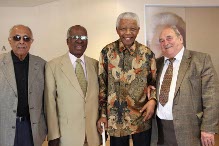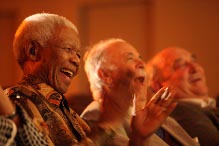
Surviving Rivonia Trialists Ahmed Kathrada, Andrew Mlangeni, Nelson Mandela and Denis Goldberg
June 9, 2010 – This Friday marks the historic World Cup kick-off day for the first FIFA World Cup™ ever held on the African continent.
June 11 has further significance in the history of South Africa, however, as the day that Nelson Mandela and his seven comrades were convicted of sabotage in the Rivonia Trial, which ended 46 years ago.
On June 11, 1964, Mr Mandela, Walter Sisulu, Ahmed Kathrada, Raymond Mhlaba, Denis Goldberg, Andrew Mlangeni, Elias Motsoaledi and Govan Mbeki were found guilty of sabotage. The following day, the eight men, who had expected the death sentence, were each sentenced to a term of life imprisonment.
Goldberg, because he was white, was separated from the group and incarcerated at Pretoria Central Prison. Mr Mandela and the others arrived in the early hours of the morning of June 13 on Robben Island.
Mr Mandela, Sisulu, Mhlaba and Kathrada were transferred to Pollsmoor Prison on the mainland in 1982. After he was diagnosed with tuberculosis in August 1988, Mr Mandela was treated at Tygerberg Hospital and then at the Constantiaberg Medi-Clinic before being transferred to Victor Verster Prison outside Paarl in December that year.
He was released from the gates of the prison on February 11, 1990.
Goldberg was released in 1985 and Mbeki in 1987. Sisulu, Kathrada, Mhlaba, Motsoaledi and Mlangeni were released in October 1989.
Kick-off day also marks the 22nd anniversary of the “Free Mandela” concert held in Wembley Stadium in London on June 11, 1988. The concert was billed as Mr Mandela’s 70th birthday concert but was staged to highlight the plight of all political prisoners in South Africa and to call for their release.
The date of the World Cup final on July 11 is also a historic day in the anti-apartheid struggle. On this day in 1963, police raided Liliesleaf Farm in Rivonia and made several arrests, including those of Sisulu and Kathrada. Some of the other accused were arrested elsewhere.
Mandela was not among them. He was, by then, already a sentenced prisoner. On November 7, 1962 he was sentenced to five years’ imprisonment for leaving the country illegally and inciting workers to strike. The charges arose from his underground travels in 1962 to several countries in Africa where he received military training and garnered support for Umkhonto we Sizwe (Spear of the Nation), the armed wing of the African National Congress. The incitement charge arose from his call on workers to stay at home in protest against South Africa becoming a republic on May 31, 1961.
Initially held in prison in Pretoria, Mandela was sent to Robben Island in late May 1963 but two weeks later was returned, inexplicably, to Pretoria – a month before the arrests at Rivonia. He remained incarcerated with his comrades in Pretoria until found guilty.
